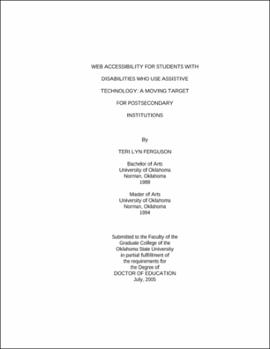| dc.contributor.advisor | Hyle, Adrienne | |
| dc.contributor.author | Ferguson, Teri Lyn | |
| dc.date.accessioned | 2013-11-26T08:34:26Z | |
| dc.date.available | 2013-11-26T08:34:26Z | |
| dc.date.issued | 2005-07 | |
| dc.identifier.uri | https://hdl.handle.net/11244/7392 | |
| dc.description.abstract | Scope and Method of Study: The purpose of this study was to determine what colleges and universities are doing to help students with disabilities who use assistive technology access asynchronous web-based courses. Participants interviewed included 19 instructional technology, distance learning, ADA coordinators, and chief academic officers from four institutions in a state in the Midwest. Two institutions were regional universities, and two were two-year colleges. | |
| dc.description.abstract | Findings and Conclusions: The evidence in this study revealed barriers to the implementation of current legislation that says that ADA law applies to the Internet. One barrier is the institution in the form of strong hierarchies, lack of resources, and reticent administrators when facing strong faculty groups. Personnel also acted as barriers through their behavior and role conflict. Conclusions drawn from study evidence include few institutions rely on a plan for implementing accessibility measures. Most respondents admitted to addressing online accessibility on a case-by-case basis. Next, most of the respondents in the study were unclear about the legal requirements and what constituted assistive technology. Also, no institution made accessibility training a priority when training faculty to build courses. There also appears to be a lapse in online training for accessibility. Even though national studies suggest the presence of a notable population of students with disabilities in distance education, this study revealed that very few students were actually enrolled in online courses. Something or someone at those institutions prevents or discouraged their enrollment. The study suggests that current Office of Civil Rights rulings and existing federal law are not enough to deter poor practices. | |
| dc.format | application/pdf | |
| dc.language | en_US | |
| dc.rights | Copyright is held by the author who has granted the Oklahoma State University Library the non-exclusive right to share this material in its institutional repository. Contact Digital Library Services at lib-dls@okstate.edu or 405-744-9161 for the permission policy on the use, reproduction or distribution of this material. | |
| dc.title | Web accessibility for students with disabilities who use assistive technology: A moving target for postsecondary institutions | |
| dc.contributor.committeeMember | Gunzenhauser, Michael | |
| dc.contributor.committeeMember | Harris, Ed | |
| dc.contributor.committeeMember | Bull, Kay | |
| osu.filename | Ferguson_okstate_0664D_1453.pdf | |
| osu.accesstype | Open Access | |
| dc.type.genre | Dissertation | |
| dc.type.material | Text | |
| thesis.degree.discipline | Higher Education | |
| thesis.degree.grantor | Oklahoma State University | |
